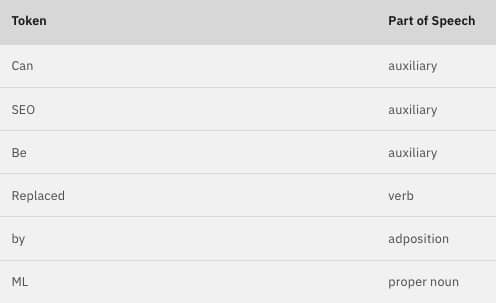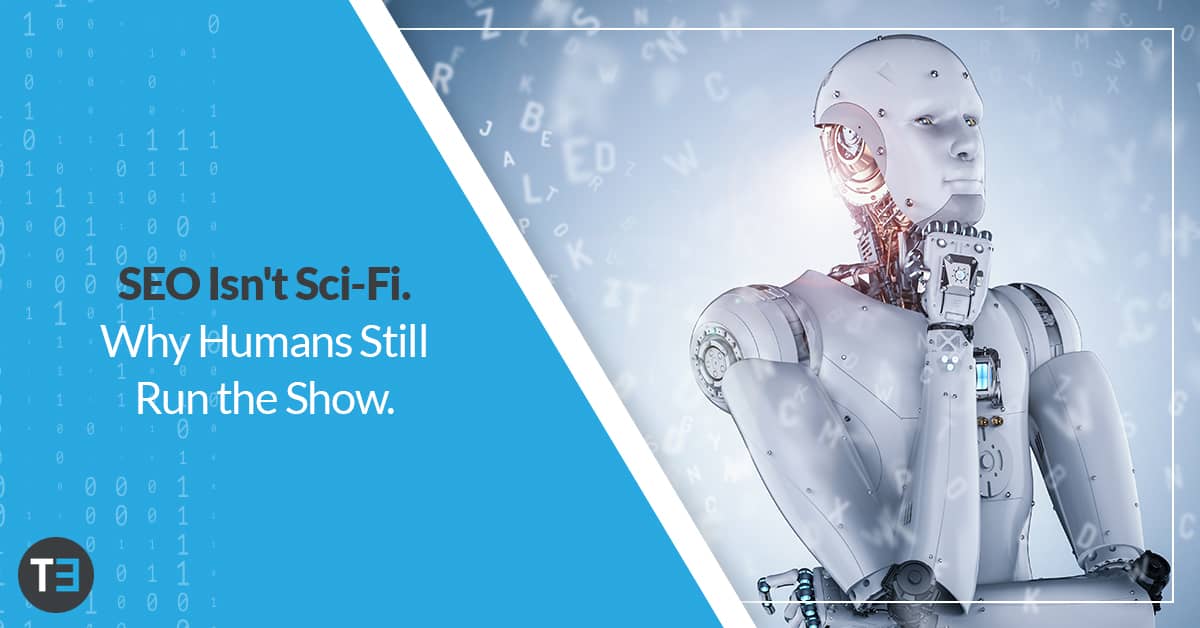Can SEO Be Replaced by Machine Learning?
7 Minute Read
Machine learning is a fixture of search engine optimization, and it’s only going to become more ingrained over time. Google has revealed that 15% of online searches every day have never been seen before. Naturally, a tech giant would invest in automation to find and deliver the best results for these novel queries.
However, although machine learning is driving the latest developments in SEO, it has not replaced the human element. In fact, many SEOs and consumers alike misunderstand what machine learning is and how it’s being implemented in search.
Don’t get sucked in by the hype. Machine learning is a powerful tool for SEO and search marketing, but the robots aren’t coming for us just yet.
People Still Have the Power
Countless sci-fi stories, movies, and other media depict human creators overcome by their creations. Most people interpret this as a warning against the “evils of technology,” but it’s actually a message to creators to be cautious in how and what they create.
People make machines. This means that human beings program them to learn. Although we use the term “machine learning,” computers can’t actually think and learn without the rules and processes put in place by the programmer.
These rules make up the “magic” or “special sauce” that founders love to tout at slick media events and product launches. In a sense, these programs are akin to magic because the vast majority of people are not privy to the inner workings; the tech industry is notorious for “blackbox” designs where the inputs and outputs are known but the actual processes are trade secrets.
But, as with all magic tricks, just because you don’t know how it works does not mean anything supernatural is afoot. In fact, the so-called “game-changing” AI programs developed by tech giants often depend on human labor to operate.
So what does this mean for improving search rankings for your business? As with any trend in SEO, it means shutting out the noise and harnessing the tools available to make it easier for customers to find businesses and encourage them to buy.

What Is Machine Learning?
Machine learning as a concept is much older than you probably think. The term was first coined in 1959 by a computer scientist at IBM.
Early experiments in machine learning enabled computers to best human players in checkers. Today, the applications of machine learning are much, much more robust.
IBM provides a helpful definition for understanding the usefulness of machine learning:
“Machine learning is an important component of the growing field of data science. Through the use of statistical methods, algorithms are trained to make classifications or predictions, uncovering key insights within data mining projects.”
Anyone with even a basic understanding of SEO knows that it’s all about the data. The role and responsibilities of SEOs have expanded, but the time they have to do it all has stayed the same (or, in many cases, become tighter).
Computer programs can identify details within massive volumes of data much faster and with greater accuracy than human users can. Machine learning is essential for this process, as the program must “know” how to make connections and report specific information without constant human input and oversight.
In effect, programs that run on machine learning serve as the digital assistant for SEOs everywhere. These machines perform very valuable tasks, but they don’t take the place of human workers.

How Can Machine Learning Be Used in SEO?
Machine learning makes it possible for SEOs to work smarter, not harder. Search marketers enter inputs such as keywords into the machine, then they use their knowledge and experience to leverage the outputs (such as additional opportunities for content creation, optimization, etc.).
One of the main sources of confusion around machine learning and SEO seems to be how Google is implementing the former and how it’s driving changes in the latter. Much has been written about Google RankBrain, a machine learning process introduced by Google to interpret queries and deliver more accurate, personalized results to the searcher.
RankBrain has effectively put an end to the ability to “outsmart” or “game” Google search results. And yet, countless self-proclaimed SEO thought leaders have written thousands of articles claiming to know the “secrets” of Google RankBrain and how to exploit it.
Savvy SEOs recognize the importance of harnessing machine learning to streamline workflows to reach their clients’ goals faster – not trying to break into the “black box” for clues about how Google’s search algorithms work. This approach benefits multiple aspects of SEO, including:
1. Keywords, Queries, and Content
One of the very real benefits of machine learning in SEO is the amount of data available to business owners and marketers about what and how customers search. Instead of relying on a static keyword list, you can reach a much broader section of your audience by optimizing for long-tail queries that represent actual questions and information needs.
Machine learning algorithms enable SEOs to determine particular frequencies and patterns in search against high volumes of data. Tools such as IBM’s Watson Natural Language Understanding can help identify trends in search behavior and lead to better-informed decisions when it comes to creating and optimizing content that is tailored to the customer.

These insights would not be possible without machine learning. However, once automated tools identify these queries, it is up to marketers to implement them in ways that improve SEO for their clients by:
- Writing compelling content that speaks to customers’ wants, needs, and goals
- Aligning the content with the brand so it matches the tone and messaging of the business
- Optimizing website content so it ranks in search results, drives web traffic, and generates leads
Machine learning by itself will only get you partway through the SEO process. After utilizing online tools for keyword research, marketers and businesses must rely on their ingenuity and understanding of the audience to develop content that ranks, engages, and boosts revenue.
2. Analytics and Reporting
Another key component of leveraging machine learning as a tool (not as the be-all, end-all of SEO) is to see what works and what doesn’t after content is written, optimized, published, and starts to perform. Whether you dominate the rankings or your site is still under-performing, you need to know if your efforts are paying off.
In many respects, analytics software and platforms have been implementing machine learning for a long time. These processes run in the background, gathering data on website traffic, search rankings, and much more.
Once again, however, the capabilities of machine learning must be balanced with human intuition and decision-making to deliver meaningful insights. Interpretation of analytics and reporting data is a key cornerstone of the services offered by reputable marketing agencies. Without it, business owners are essentially at the mercy of numbers with very little context for how to improve their marketing.
3. Optimizing for Local Search

Any business with a physical storefront recognizes the importance of consistency and accuracy when customers try to find them online. Your business name, address, and phone number (known as NAP data) need to be correct and appear the same across your local listings. If it isn’t, you run the risk of losing visibility and leads.
Manually tracking down and updating NAP data on every listing is a tedious process. Fortunately, machine learning has made it possible to standardize listings using a single online platform.
Once a machine learns how the name, address, and phone number should look for your business, it can crawl the web to find all of your online listings. Programs such as Yext enable marketers and business owners to claim new listings, identify inconsistencies, and make changes for accuracy.
Today, search results are closely tied to the user’s location. With machine learning, SEOs can easily deliver the most accurate results. This builds trust with customers, in addition to streamlining the process for customers to find businesses online and – even more importantly – convert.
What Does Machine Learning Mean for the Future of SEO?
As tools evolve, so too do the ways to use them effectively. Today, SEO encompasses multiple components of successful marketing, from the user experience on the website to visibility across the internet.
Machine learning has already resulted in a number of SEO benefits, automating some of the more labor-intensive aspects of keyword research, local listings optimization, and analytics. What it has not done (thankfully) is allow SEOs to rely on machines entirely; the “experts” who brag about a set-it-and-forget-it approach are either exaggerating the lack of effort or outright lying.

The key components of successful marketing – knowing your customers, engaging them, and earning their business – have not changed. Machine learning has simply improved the speed and efficiency with which professionals can collect the information they need to design and execute effective campaigns.
Everyday use is the best way to understand the benefits of machine learning for SEO (as well as disabuse yourself of any misconceptions about the machines taking over). You will get major insights from the data, but you will also see many opportunities to get creative and thoughtful with your search marketing.
Upgrade Your SEO Today
Many business owners are curious about search engine optimization. You might have even tried to do it yourself when you got your company off the ground or launched your first website. Although anyone can use today’s machine learning tools, owners and in-house marketers often have difficulty leveraging the insights or finding the time to implement them.
Twelve Three Media can help. Our SEO experts stay on the cutting edge, exploring the latest updates, tools, and strategies to boost our clients’ visibility online and drive results.
Gain the unfair marketing advantage. Contact Twelve Three Media today to learn how our team can help you reach your goals!
